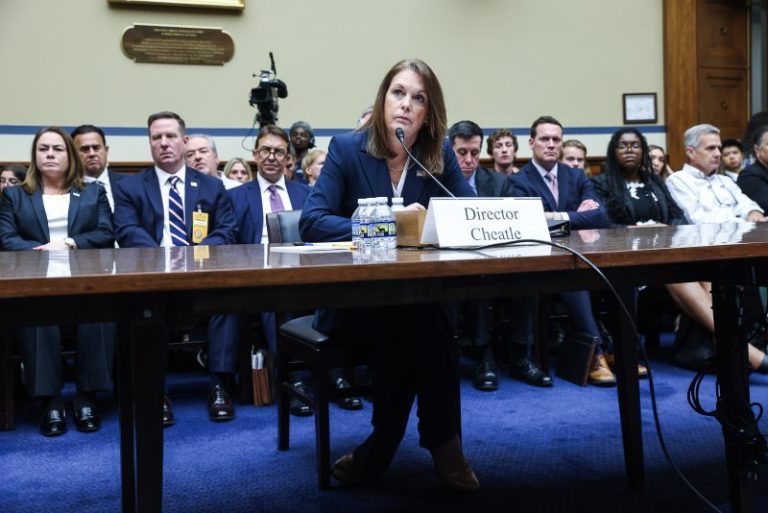House Speaker Mike Johnson (R-La.) and Minority Leader Hakeem Jeffries (D-N.Y.) have tapped seven Republican and six Democratic lawmakers to serve on a bipartisan task force investigating the attempted assassination of Donald Trump.
All 13 lawmakers have backgrounds and experience relevant to the committee’s role: seeking accountability and answers after a gunman wounded the former president, killed one person and critically injured two others during a July 13 campaign rally in Butler, Pa.
Rep. Mike Kelly (R-Pa.), who represents Butler County and has ties to law enforcement in the area, was appointed to chair the panel. He is joined by Republican Reps. Mark Green (Tenn.), David Joyce (Ohio), Laurel Lee (Fla.), Michael Waltz (Fla.), Clay Higgins (La.) and Pat Fallon (Tex.).
From the other side of the aisle, Rep. Jason Crow (Colo.), a former Army ranger who served in Iraq and Afghanistan, was appointed the panel’s ranking Democrat. Democratic Reps. Lou Correa (Calif.), Madeleine Dean (Pa.), Chrissy Houlahan (Pa.), Glenn Ivey (Md.) and Jared Moskowitz (Fla.) are the other members.
“We have the utmost confidence in this bipartisan group of steady, highly qualified, and capable Members of Congress to move quickly to find the facts, ensure accountability, and help make certain such failures never happen again,” Johnson and Jeffries said in a joint statement.
They said the task force will have subpoena authority and will assume control over all House committee investigations into the assassination attempt.
In a deeply polarized Congress, similar commissions have seen mixed results in recent years. But so far, lawmakers have demonstrated an unusually serious and cooperative approach toward investigating the attempted assassination of Trump, the former president and 2024 Republican nominee. Republicans protested the last high-profile select committee formed by a Democratic-led House to investigate the Jan. 6, 2021, attack on the U.S. Capitol. Only two Republicans ultimately served on it.
The three primary goals of this panel include understanding the security and communications breakdowns that allowed Thomas Matthew Crooks, 20, to open fire from a rooftop that was just outside the security perimeter of the outdoor rally; ensuring accountability; and preventing Secret Service failure going forward. The last shooting at a U.S. leader under Secret Service protection was in 1981, when a gunman fired at President Ronald Reagan as he left a speaking engagement at the Washington Hilton.
Senate lawmakers are set to hold a hearing with acting Secret Service Director Ronald Rowe and Deputy FBI Director Paul Abbate on Tuesday.
In the days since the shooting, lawmakers have been frustrated by the lack of detailed information offered by the Secret Service.
A day after a contentious appearance before the House Oversight Committee last week, Secret Service Director Kimberly Cheatle resigned from her post. FBI Director Christopher A. Wray offered a more detailed account of the assassination attempt in testimony before the House Judiciary Committee on Wednesday, though he also angered some lawmakers by saying Trump was wounded by either a bullet or shrapnel. The bureau later clarified that investigators believe Trump was wounded by either a bullet or a bullet fragment.
Ivey, a former assistant U.S. attorney who serves on two of the House committees that have already launched investigations into the shooting, said the task force will have to quickly collect information from multiple sources to put together a comprehensive account of what happened that day. During a visit to the Butler, Pa., site after the shooting, Ivey said, he found local law enforcement officials and people on the ground who were “more than willing to share their insight.”
A former U.S. government official who has experience with past investigations into major security incidents said that lawmakers should focus on putting together an independent timeline to compare it against the official protection plan crafted by Secret Service ahead of the rally.
That will assist members in determining “whether it was the plan itself that was wrong, whether they gave short shrift to what the envelope of protection looked like or if somebody didn’t do their job — and why,” said the official, who spoke on the condition of anonymity to speak candidly about sensitive security issues.
Since the assassination attempt, Secret Service officials have encouraged the Trump campaign to avoid large outdoor rallies, The Washington Post reported last week. But Trump over the weekend wrote in a post on Truth Social that he would continue to stage such rallies.

